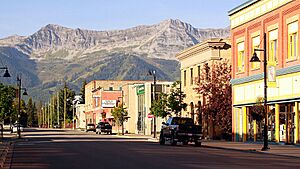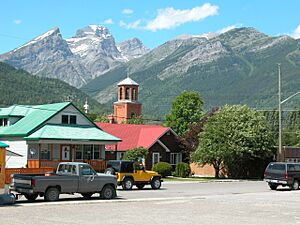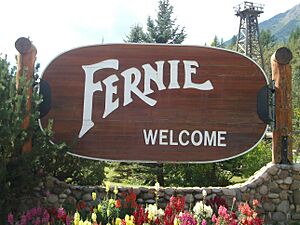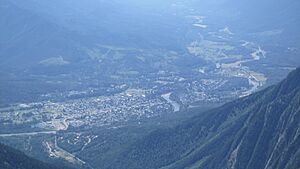Fernie, British Columbia facts for kids
Quick facts for kids
Fernie
|
|||
|---|---|---|---|
| The Corporation of the City of Fernie | |||

Downtown Fernie, looking south
|
|||
|
|||
| Motto(s):
"In montibus ad flumen" (Latin)
"In the mountains by the river" |
|||
| Country | Canada | ||
| Province | British Columbia | ||
| Region | Elk Valley/East Kootenay | ||
| Regional district | East Kootenay | ||
| Established | 1904 | ||
| Area | |||
| • City | 13.50 km2 (5.21 sq mi) | ||
| Elevation | 1,010 m (3,314 ft) | ||
| Population
(2016)
|
|||
| • City | 5,249 Ranked 692nd |
||
| • Metro | 7,192 | ||
| Time zone | UTC-7 (Mountain Standard (MST)) | ||
| • Summer (DST) | UTC-6 (Mountain Daylight (MDT)) | ||
| Postal code span |
V0B 1M(0–6)
|
||
| Area code(s) | 250, 778, 236, 672 | ||
| Highways | |||
Fernie is a city in the beautiful Elk Valley area of southeastern British Columbia, Canada. It's nestled right in the Rocky Mountains. The city was founded in 1898 and officially became the City of Fernie in July 1904.
Today, Fernie is home to over 5,000 people. Many more live in nearby communities. In winter, the city gets even busier. This is because lots of visitors come to enjoy the snow.
Fernie sits along the Elk River. It's part of a main travel route through the Rockies. This route goes through the Crowsnest Pass, about 40 kilometers (25 miles) to the east. Fernie is the biggest and oldest town between Cranbrook and Lethbridge. It serves as an important center for other communities in the Elk Valley.
Contents
Exploring Fernie's Location
Fernie is unique because it's the only city in Canada completely surrounded by the Rocky Mountains. The city is built in a curved glacial valley. The Elk River flows through this valley.
Three smaller streams also join the Elk River here. These are Coal, Lizard, and Fairy Creeks. They all start in nearby valleys.
Mountains Around Fernie
To the north of Fernie, you'll find Mount Fernie, Mount Klauer, The Three Sisters, and Mount Proctor. To the northeast is Mount Hosmer. Fernie Ridge is to the east.
To the southeast, there's Morrissey Ridge and Castle Mountain. The Lizard Range is to the southwest. The Lizard Range is home to Fernie Alpine Resort. This is one of the biggest ski resorts in Canada.
Fernie's Past: From Coal to Skiing

Today, people love Fernie for its mountain slopes and outdoor fun. But in the past, the focus was on what was inside the mountains. Fernie's story began with coal.
In the late 1800s, a man named William Fernie started the coal industry here. He founded the Crows Nest Pass Coal Company in 1897. A temporary camp was set up near Coal Creek. The Canadian Pacific Railway arrived the next year. Soon, a town grew up next to the railway.
Coal Mining and Disasters
Underground mines were dug about 10 kilometers (6 miles) from Fernie. A small community called Coal Creek grew next to these mines. In 1902, a terrible mine explosion happened. It sadly took the lives of 109 miners.
Fernie itself never had mines. Instead, it became a center for managing the coal industry. It also had a local brewery that made Fernie Beer.
Changes in Mining
Like many towns that relied on one industry, Fernie had good times and tough times. These were often linked to the price of coal. The mines at Coal Creek closed in 1960. Mining then moved to Michel and Natal. These places were about 25 kilometers (15 miles) upriver.
In the 1970s, huge open-pit mines opened there. They supplied coal to Asian industries. Fernie remained an important home for mine workers. Today, Teck Resources runs four open-pit mines. They send long trains full of coal through Fernie to the Pacific Coast. From there, the coal is shipped overseas.
Flathead Valley Avalanches
On December 28, 2008, two avalanches happened near Fernie. They buried 11 snowmobilers. Sadly, eight of the riders lost their lives.
Fernie's Unique Buildings
In 1904, a big fire destroyed much of Fernie's downtown. After this, the city decided that all new buildings had to be made of 'fireproof' materials. These included brick and stone. So, a new city center was built with strong brick buildings.
But another, even bigger fire hit on August 1, 1908. Strong winds pushed a nearby forest fire into a lumber yard. This caused a huge firestorm that melted brick and mortar. The entire city was wiped out in one afternoon. Luckily, few people were hurt.
For a second time, a grand brick downtown rose from the ashes. Many of these historic buildings still stand today. They are a special and cherished part of Fernie.
Sports and Fun in Fernie
Summer in Fernie is usually quieter than winter. But mountain biking, fly fishing, and golf are becoming very popular.
| Club | League | Sport | Venue | Established | Championships |
|---|---|---|---|---|---|
| Fernie Ghostriders |
|
Ice hockey | Fernie Memorial Arena |
|
|
Fernie Memorial Arena Incident
On October 17, 2017, there was an incident at the Fernie Memorial Arena. It involved a leak that caused the deaths of three workers. Two were city employees, and one was from a refrigeration company. Because of this, the city declared a state of emergency. People had to leave the area for several days.
The local hockey team, the Ghostriders, had to play in a different town for a while. The city later decided to change the arena's cooling system to a safer type. The team then moved back to the Fernie Memorial Arena for the next season.
People from Fernie
Many interesting people have lived in or are from Fernie. Here are a few:
- Angie Abdou, a Canadian writer
- Emily Brydon, an Olympic alpine skier
- Shane Churla, a hockey player who played in the Stanley Cup finals
- James Gladstone, the first Indigenous person to be part of the Senate of Canada
- Alex Lifeson, the guitarist for the band Rush
- Craig Kelly, a professional snowboarder
Local News and Entertainment
Newspapers
- e-know - East Kootenay news online weekly
- Fernie Fix - a monthly magazine
- The Free Press - a weekly newspaper
Radio Stations
- 107.9 FM - 2Day FM, plays modern adult music
- 103.5 FM - CJAY 92, plays active rock music
- 99.1 FM - The Drive, plays active rock music
- 97.7 FM - CBC Radio One, for public news and talk
- 92.7 FM - B104, plays country music
Cable Television
Rogers Communications provides cable TV in Fernie. It offers many channels from Vancouver and Calgary. It also has local shows on Rogers TV channel 10.
Schools and Learning
School District 5 Southeast Kootenay runs the public schools in Fernie:
- Isabella Dicken Elementary School (for Grades K-6)
- Fernie Secondary School (for Grades 7-12)
There is also a French-language primary school called école Sophie-Morigeau.
Private schools include:
- The Fernie Academy (for Grades K-12)
For higher education, students can attend:
- College of the Rockies
Fernie's Weather
Fernie has a cool and wet climate. Summers have warm days and cool nights. Winters are cold and snowy. Even though it's cold, the winters are milder than some other places at the same latitude in North America. This is partly due to warm winds called chinook winds.
| Climate data for Fernie | |||||||||||||
|---|---|---|---|---|---|---|---|---|---|---|---|---|---|
| Month | Jan | Feb | Mar | Apr | May | Jun | Jul | Aug | Sep | Oct | Nov | Dec | Year |
| Record high °C (°F) | 15.0 (59.0) |
15.5 (59.9) |
21.0 (69.8) |
28.9 (84.0) |
33.0 (91.4) |
36.1 (97.0) |
36.0 (96.8) |
36.0 (96.8) |
33.0 (91.4) |
28.0 (82.4) |
18.3 (64.9) |
12.5 (54.5) |
36.1 (97.0) |
| Mean daily maximum °C (°F) | −0.7 (30.7) |
1.6 (34.9) |
6.5 (43.7) |
11.9 (53.4) |
16.9 (62.4) |
20.6 (69.1) |
25.1 (77.2) |
25.1 (77.2) |
19.3 (66.7) |
11.6 (52.9) |
2.9 (37.2) |
−1.9 (28.6) |
11.6 (52.9) |
| Daily mean °C (°F) | −5.2 (22.6) |
−3.8 (25.2) |
0.8 (33.4) |
5.4 (41.7) |
9.9 (49.8) |
13.6 (56.5) |
16.8 (62.2) |
16.3 (61.3) |
11.3 (52.3) |
5.5 (41.9) |
−1.1 (30.0) |
−6.1 (21.0) |
5.3 (41.5) |
| Mean daily minimum °C (°F) | −9.6 (14.7) |
−9.2 (15.4) |
−4.9 (23.2) |
−1.1 (30.0) |
2.8 (37.0) |
6.6 (43.9) |
8.4 (47.1) |
7.4 (45.3) |
3.3 (37.9) |
−0.7 (30.7) |
−5.0 (23.0) |
−10.1 (13.8) |
−1.0 (30.2) |
| Record low °C (°F) | −39.4 (−38.9) |
−40.0 (−40.0) |
−32.8 (−27.0) |
−20.0 (−4.0) |
−11.0 (12.2) |
−2.2 (28.0) |
0.0 (32.0) |
−2.0 (28.4) |
−18.3 (−0.9) |
−24.4 (−11.9) |
−32.2 (−26.0) |
−41.7 (−43.1) |
−41.7 (−43.1) |
| Average precipitation mm (inches) | 139.3 (5.48) |
88.0 (3.46) |
97.8 (3.85) |
92.8 (3.65) |
91.8 (3.61) |
110.0 (4.33) |
67.0 (2.64) |
51.9 (2.04) |
75.8 (2.98) |
115.7 (4.56) |
179.1 (7.05) |
117.7 (4.63) |
1,227.1 (48.31) |
| Average rainfall mm (inches) | 55.8 (2.20) |
41.5 (1.63) |
60.6 (2.39) |
80.0 (3.15) |
88.8 (3.50) |
109.8 (4.32) |
67.0 (2.64) |
51.9 (2.04) |
75.4 (2.97) |
109.4 (4.31) |
123.0 (4.84) |
39.0 (1.54) |
902.2 (35.52) |
| Average snowfall cm (inches) | 83.5 (32.9) |
46.4 (18.3) |
37.2 (14.6) |
12.9 (5.1) |
3.1 (1.2) |
0.2 (0.1) |
0.0 (0.0) |
0.0 (0.0) |
0.4 (0.2) |
6.4 (2.5) |
56.2 (22.1) |
78.7 (31.0) |
324.9 (127.9) |
| Average precipitation days (≥ 0.2 mm) | 15.0 | 11.0 | 12.8 | 12.5 | 14.5 | 16.1 | 10.0 | 9.2 | 9.2 | 12.5 | 15.0 | 13.3 | 151.0 |
| Average rainy days (≥ 0.2 mm) | 4.9 | 4.4 | 8.6 | 11.2 | 14.2 | 16.1 | 10.0 | 9.2 | 9.2 | 11.7 | 9.2 | 3.6 | 112.1 |
| Average snowy days (≥ 0.2 cm) | 12.0 | 8.2 | 6.4 | 2.7 | 0.7 | 0.0 | 0.0 | 0.0 | 0.1 | 1.6 | 7.7 | 11.4 | 50.7 |
 | Emma Amos |
 | Edward Mitchell Bannister |
 | Larry D. Alexander |
 | Ernie Barnes |






